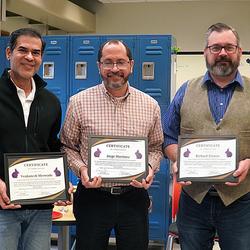February 13, 2026
MDE/IDES programs honor three outstanding teaching partners from across Purdue
Three exceptional teaching partners from across Purdue have been recognized for their outstanding impact on Multidisciplinary Engineering (MDE) and Interdisciplinary Engineering Studies (IDES) students. Honored as “one of the best of the best in teaching,” these collaborators exemplify how cross-campus partnerships strengthen interdisciplinary education and student success.















